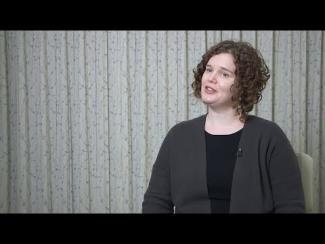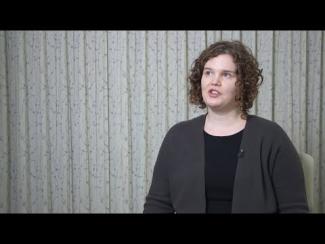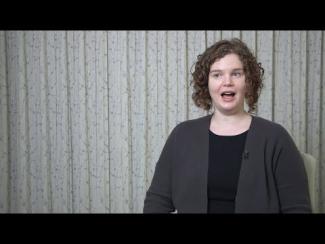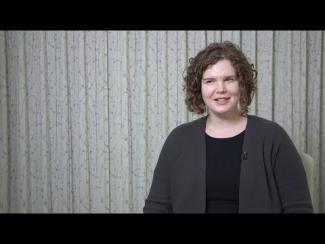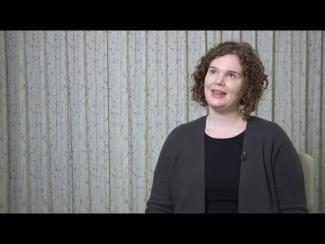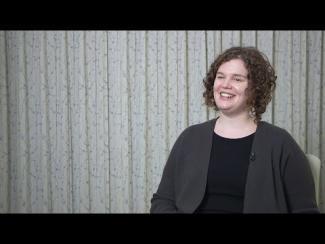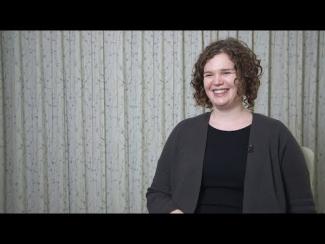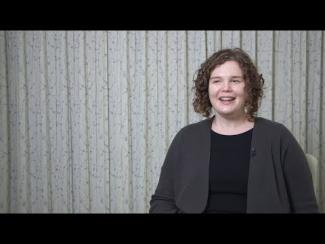The Yiddish Book Center's
Wexler Oral History Project
A growing collection of in-depth interviews with people of all ages and backgrounds, whose stories about the legacy and changing nature of Yiddish language and culture offer a rich and complex chronicle of Jewish identity.
Sarah Zarrow's Oral History
Sarah Ellen Zarrow, scholar of Jewish history at Western Washington University in Bellingham, Washington, was interviewed by Christa Whitney on December 18th, 2018, at the Association for Jewish Studies Conference in Boston, Massachusetts. Sarah's father's family were Eastern European Jews and her mother's Anglo-Saxon ancestors can trace their history back to the colonies in the 1600s. When Sarah was eight her Jewish grandmother brought numerous relatives from Russia to Worcester, Massachusetts; they fascinated Sarah who became interested in Yiddish and her Jewish heritage. Sarah grew up in Stow, Massachusetts in a big, sprawling house in the woods. Although not very observant, her family did light candles on Shabbes and she went to Hebrew school. Surrounded by non-Jews, Sarah felt very different from her peers. She wonders about how the experience of interacting with her Russian relatives stimulated her later academic interests. She talks about the striking differences between the Jewish and non-Jewish sides of her family. Sarah went to college at Vassar where she majored in religion. After spending a year abroad, she got a master's degree in Jewish Education and then pursued a doctoral degree in Jewish History. She began studying Yiddish on her own in high school and spent a fulfilling summer after her first year of college at the Yiddish Book Center. She took a Yiddish literature course from Aaron Lansky and originally wanted that to be her focus but eventually figured out that this was not a good fit for her. She instead became interested in studying Jewish life in Eastern Europe from a historical perspective. Sarah talks about early trips to Vilnius and Belarus and the mentors with different approaches she had along the way. She became involved with Yiddish groups and Yiddish song and dance. She got funding after college to study Yiddish singing communities that sprung up in Eastern Europe as part of the cultural revival movement. She maintained her involvement with Yiddish dance for a while but it's difficult to find opportunities in the Pacific Northwest. Sarah's doctoral dissertation was about Jewish museums in Poland and how they reflect specific narratives of Jews living in that country from the late 1800s through 1930. She feels that she was lucky that a focus on culture rather than politics was becoming acceptable when she was coming into her field. She talks about learning Polish and other languages and becoming comfortable with the logic of specific languages. Sarah discusses being in a field where most of the senior level scholars are men; now that she's studying women, gender, and education, that has changed. Sarah got involved from the very beginning with "In Geveb", the online-only journal of Jewish Studies. They try to reach a popular audience while upholding academic standards. She talks about how they established a visual identity to try to challenge people's preconceptions about what the journal is all about. She values the connections with others with similar interests that started in the early Yiddish Book Center days. She considers it important to disentangle Jewish Studies from those interested in these topics – not all the students or academics are Jewish. Sarah believes that Yiddish is still finding its place within Jewish Studies curricula. She tends to emphasize diversity and points out that there is a Sephardic Jewish community in the Pacific Northwest. Sarah is uncomfortable with the term "Jewish revival" and with the notion that Polish Jewish history is solely about the Holocaust. Too often people make assumptions about the political views of Yiddish speakers; in fact, throughout history Yiddish-speakers have represented many points of view. Sarah welcomes new Yiddish learners to this strange new world and advises one to be open to learning from a variety of teachers, even those who are not traditional teachers.
This interview was conducted in English.
Sarah Zarrow was born in Stow, MA in 1982.

